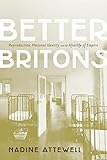Better Britons : Reproduction, National Identity, and the Afterlife of Empire / Nadine Attewell.
Material type: TextPublisher: Toronto : University of Toronto Press, [2014]Copyright date: ©2014Description: 1 online resource (336 p.) : 3 b&w illustrationsContent type:
TextPublisher: Toronto : University of Toronto Press, [2014]Copyright date: ©2014Description: 1 online resource (336 p.) : 3 b&w illustrationsContent type: - 9781442647022
- 9781442667068
- Decolonization -- Colonies -- Great Britain -- History -- 20th century
- Human reproduction -- Government policy -- Australia -- History -- 20th century
- Human reproduction -- Government policy -- Great Britain -- History -- 20th century
- Human reproduction -- Government policy -- New Zealand -- History -- 20th century
- National characteristics, Australian -- History -- 20th century
- National characteristics, British -- History -- 20th century
- National characteristics, New Zealand -- History -- 20th century
- LITERARY CRITICISM / European / English, Irish, Scottish, Welsh
- 304.6094109/04 23
- HQ766.5.G7 .A884 2014
- online - DeGruyter
| Item type | Current library | Call number | URL | Status | Notes | Barcode | |
|---|---|---|---|---|---|---|---|
 eBook
eBook
|
Biblioteca "Angelicum" Pont. Univ. S.Tommaso d'Aquino Nuvola online | online - DeGruyter (Browse shelf(Opens below)) | Online access | Not for loan (Accesso limitato) | Accesso per gli utenti autorizzati / Access for authorized users | (dgr)9781442667068 |
Frontmatter -- Contents -- Illustrations -- Acknowledgments -- Introduction -- Part One: Beginnings -- Chapter One. An Island Solution: Utopian Forms and the Routing of National Identity -- Chapter Two. Whiteness for Beginners: An Australian Experiment -- Part Two: Endings -- Chapter Three. “I kept on dreaming about the sea”: Foreclosure and the Aborting Woman -- Chapter Four. Apprehending Loss: Maternity at the Margins -- Chapter Five. Shrunk in the (White)wash: Britain at World’s End -- Envoi -- Notes -- Bibliography -- Index
restricted access online access with authorization star
http://purl.org/coar/access_right/c_16ec
In 1932, Aldous Huxley published Brave New World, his famous novel about a future in which humans are produced to spec in laboratories. Around the same time, Australian legislators announced an ambitious experiment to “breed the colour” out of Australia by procuring white husbands for women of white and indigenous descent. In this study, Nadine Attewell reflects on an assumption central to these and other policy initiatives and cultural texts from twentieth-century Britain, Australia, and New Zealand: that the fortunes of the nation depend on controlling the reproductive choices of citizen-subjects.Better Britons charts an innovative approach to the politics of reproduction by reading an array of works and discourses – from canonical modernist novels and speculative fictions to government memoranda and public debates – that reflect on the significance of reproductive behaviours for civic, national, and racial identities. Bringing insights from feminist and queer theory into dialogue with work in indigenous studies, Attewell sheds new light on changing conceptions of British and settler identity during the era of decolonization.
Mode of access: Internet via World Wide Web.
In English.
Description based on online resource; title from PDF title page (publisher's Web site, viewed 01. Dez 2023)


